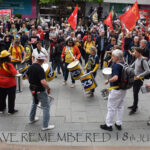Has anyone else noticed how the British seem to be Americanising their own history?
This question is not asked from an insular perspective. I find it no more irritating that history is altered to make it more digestible to an American audience than I would find it if it was made more digestible to, say, a Taiwanese audience. The parameter is unimportant. My objection is that the altered form, by definition, will always be wrong.
This odd process seemed to be sparked back around 2006 by the movie version of V For Vendetta, which I have discussed more than once on this blog. The comic book character the film was based on, the eponymous V, was invented in the 1980s by Alan Moore to be a bloody anarchist inspired by the Gunpowder Plotter, Guy Fawkes. On celluloid, V was instead shown to be a wise-but-violent democrat, using his campaign for freedom as a justification for avenging terrible crimes committed against himself in the past. This sort of hard-hittin’, bomb-some-democracy-into-’em, freedom-lover perspective fitted more neatly with the way heroes have usually been portrayed in Hollywood movies, especially Westerns, since time-immemorial. Moore may have been unimpressed by the retooling of the character, but a lot of Americans in particular lapped it up, and there followed a substantial international mania about Guy Fawkes – an historical figure little-known outside the UK or Ireland up to that point. Even today, many left-leaning political movements will wear replicas of V’s Guy Fawkes mask when campaigning or taking direct action.
Popcorn history v real history
For those of us in the UK who have a yen for historical accuracy – including myself – this phenomenon was interesting but uncomfortable. It was not just because V was being twisted into something he had not quite been in the original source material, but also because the film’s flashbacks to Fawkes’ time were wildly altered, and therefore misportrayed. His famous arrest in the vault below Parliament was much over-dramatised into a swashbuckling duel with the palace guards, where in reality, Fawkes initially tried to bluff his way with the guards by using a false name, before surrendering without a fight. And the nature and motivations of Fawkes himself were completely changed; the film portrayed him as a freedom-fighting visionary, bravely and single-handedly trying to free the good people of England from Monarchical tyranny. In the real world, the historical Fawkes and his co-conspirators were religious terrorists. Understandably angry and frustrated at years of anti-Catholic mistreatment under the reign of Queen Elizabeth I, they had hoped that the accession of her cousin, James VI of Scotland to the English throne would lead to a formal toleration of Catholics. Instead, James endorsed Elizabeth’s “anti-Recusancy” laws. Fawkes therefore wanted to destroy and exterminate the Protestant Establishment of James’ English court, and to make the country answerable to the Pope once more, under a new Monarch who could be forced to accept Catholic ways. Fawkes was not even their leader of the conspiracy, let alone a visionary; the leader was Robert Catesby. What none of the plotters was noticeably interested in was social liberty.
Now, given the film was released only about five years after the 9/11 terrorist attacks, it would have been difficult for the US market to tolerate a hero explicitly based on a religious terrorist. Doubly problematic in the US South, where the puritan-descended fanatics of the Bible Belt would be even more disgusted at a hero based on a Catholic terrorist. So the film just airbrushed these religious details out, and V became something more secular, an entity akin to Dirty Harry, but with a posh voice and bewildering dress sense.
A historical look at ahistorical films
It should be emphasised that the Fawkes mania had rather dissipated by about 2012. It should also be emphasised that there is nothing new whatever in films pertaining to discuss UK history but telling a largely fictitious version of the past. Movies such as Cromwell (1970), In The Name Of The Father (1992), and Braveheart (1995), as just a small sampling of the transgressors, have all been so enormously embroidered by the telling of events that never happened, that a genuine case could be made for their respective production teams being locked away for fraud……………….

TO READ THE REST OF THIS ARTICLE, PLEASE CLICK HERE.
Subscribe
Click here for a secure way to sign up, you will be supporting independent news. Click the button below.
Your Opinions
Disagree with this article? why not write in and you can have your say? email us




1 comment
I’d be interested in your take on the amount of USA propaganda weekly pumped out by the Yesterday channel which is often overtly anti-communist.